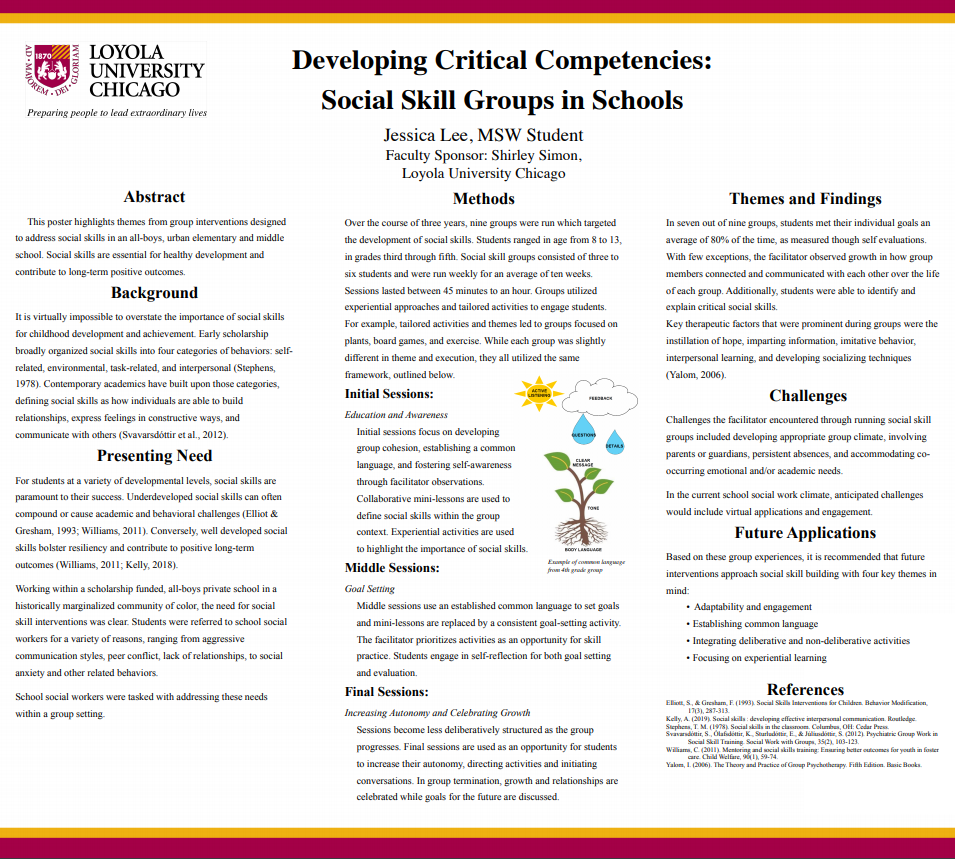Developing Critical Competencies: Social Skills Groups in Schools
Jessica Lee, Loyola University Chicago, Chicago, IL (USA)
This poster aims to illustrate the need for social skill groups in school settings, examine group interventions targeting social skill development with young men of color, and highlight key components and challenges of group interventions. Ideas for future group-based interventions will also be discussed.
View PDF of Poster / To learn more, download the Presentation Handout.
Presentation Description:
It is virtually impossible to overstate the importance of social skills for childhood development and achievement. Early scholarship broadly organized social skills into four categories of behaviors: self-related, environmental, task-related, and interpersonal (Stephens, 1978). Contemporary academics have built upon those categories, defining social skills as how individuals are able to build relationships, express feelings in constructive ways, and communicate with others (Svavarsdóttir et al., 2012). For students at a variety of developmental levels, these are the skills that are paramount to their success. Underdeveloped social skills can often compound or cause academic and behavioral challenges (Elliot & Gresham, 1993; Williams, 2011). Conversely, well developed social skills bolster resiliency and contribute to positive long-term outcomes (Williams, 2011).
This poster describes and assesses group interventions designed to address social skills in an all-boys, urban elementary and middle school. The school is a scholarship funded private school in a historically marginalized community of color. Students ranged in age from 8 to 13, in grades third through fifth. Social skill groups consisted of three to six students and were run weekly for an average of ten weeks. Groups targeted a variety of maladaptive behaviors by utilizing a psychoeducational approach and cognitive-behavioral practices. Groups focused on externalized behavior, internalized anxiety, peer conflict, self-regulation, and other related behaviors.
Over the course of intervention, groups operationalized many of Yalom’s therapeutic factors, specifically instillation of hope, imitative behavior, interpersonal learning, and developing of socializing techniques (Yalom, 2006). This poster presentation aims to 1) call attention to the need for social skill training groups in schools, 2) examine group interventions targeting social skill development, 3) highlight key components and challenges of group interventions with the specific population, and 4) propose ideas for future group interventions. This presentation will also identify gaps in literature as well as the need for additional scholarship. Ultimately, this poster presentation endeavors to generate discussion on current and possible school-based interventions addressing social skills.
References:
- Elliott, S., & Gresham, F. (1993). Social Skills Interventions for Children. Behavior Modification, 17(3), 287-313.
- Stephens, T. M. (1978). Social skills in the classroom. Columbus, OH: Cedar Press.
- Svavarsdóttir, S., Ólafsdóttir, K., Sturludóttir, E., & Júlíusdóttir, S. (2012). Psychiatric Group Work in Social Skill Training. Social Work with Groups, 35(2), 103-123.
- Williams, C. (2011). Mentoring and social skills training: Ensuring better outcomes for youth in foster care. Child Welfare, 90(1), 59-74.
- Yalom, I. (2006). The Theory and Practice of Group Psychotherapy. Fifth Edition. Basic Books.
View PDF of Poster / To learn more, download the Presentation Handout.


Jessica- I enjoyed reviewing your poster. You make a good argument for the vital importance of social skills groups for young persons, and it is significant that you addressed the importance of providing these groups to young male students of color aged 8-13. As you skillfully identify through your review/discussion of the literature, improving social skills for these young persons can have a lifelong impact on their development. Nicely done!
Jessica- I agree with Teresa-this is a professional poster. Great read! The highlight of the lit review is very informative. Groups tend to be more for females than males in our schools-learning that this research is based on an all-boys school of marginalized populations is very encouraging. Notably, people of color. I thank you for the excellent work you have done that would help me in my own career with adolescent males. Fantastic!!!
Jessica-very professional poster. You did an excellent job in reviewing the literature, clearly presenting your group intervention on social skills, and your findings and recommendations. I did not notice that all the young men came from an all boys school made up of marginalized populations. I wonder if these two characteristics - single sex school and students of color - present any specific recommendations based on thee characteristics. Just something for you to think about in the future. You represented Loyola well!